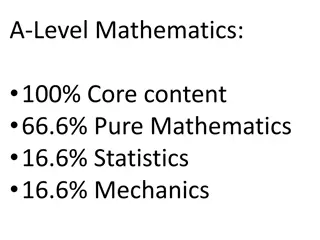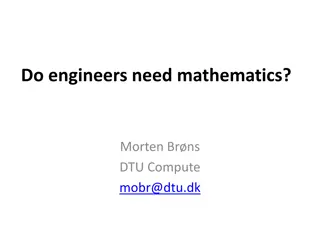Career Paths in Mathematics: A Comprehensive Overview
Explore various career paths in mathematics including roles such as accountant, actuary, auditor, data analyst, economist, mathematician, statistician, and teacher. Each profession utilizes mathematical skills in unique ways, from financial calculations to risk management and data analysis. Discover the opportunities, required skills, and average salaries in the field of mathematics.
Uploaded on Sep 17, 2024 | 0 Views
Download Presentation

Please find below an Image/Link to download the presentation.
The content on the website is provided AS IS for your information and personal use only. It may not be sold, licensed, or shared on other websites without obtaining consent from the author. Download presentation by click this link. If you encounter any issues during the download, it is possible that the publisher has removed the file from their server.
E N D
Presentation Transcript
CAREER PATHS IN MATH January 24, 2024
Overview Accountant Actuary Auditor Data Analyst Economist Mathematician Statistician Teacher
Accountant Who are they? How they use Math Accountants work with accounting firms or internal account departments with large companies. Accountants use Basic Arithmetic, Calculus, Algebra, Statistics, Probability and Financial Mathematics. Entry level accountants make $57,500 a year while some of the most experienced can make $113,130 a year.
Actuary Who are they? How they use math An Actuary is a professional with advanced mathematical skills who deals with the measurement and management of risk and uncertainty. Actuaries use statistical methods and risk theory to calculate insurance premiums. Entry-level positions start at $80,124 per year, while most experienced workers make up to $161,413 per year.
Auditor Who are they? An auditor is a person authorized to review and verify the accuracy of financial records and ensure that companies comply with tax laws. How they use math Auditors use basic arithmetic as well as mathematical modeling which may be useful when assessing the level of risk for an external audit. Auditors make an average of $77,000 a year.
Data Analyst Who are they? Data Analyst use computing and statistical reasoning to gain insights from data How they use math Data Analyst use Linear Algebra, Statistics and Calculus to analyze tons of data in a reasonable amount of time. The average salary for a data analyst is $75,653 per year.
Economist oWho are they? o Economists study the relationship between a society s resources and its production or output. How they use math o They use mathematical methods to analyze inflation, effects of taxes and unemployment levels o The average salary for an economist is $86,410 per year
Mathematician Who are they? Mathematicians use mathematical theory, computational techniques, algorithms, and the latest computer technology to solve economic, scientific, engineering, physics, and business problems. How they use math Mathematicians use high-level mathematics and technology to develop new mathematical principles, understand relationships between existing principles, and solve real-world problems. Entry-level positions start at $43,875 per year, while most experienced workers make up to $111,911 per year.
Statistician Who are they? Statisticians collect data and analyze it, looking for patterns that explain behaviour or describe the world as it is. How they use math Statisticians analyze data and apply computational techniques to solve problems. The average salary for a statistician is $92,125 per year.
Teacher Who are they? A person who helps students to acquire knowledge, competence, or virtue, via the practice of teaching. How they use math Mathematical knowledge plays a crucial role in understanding the contents of other school subjects such as science, social studies, and even music and art. The average salary for a teacher is $41,302 per year in Ontario.
Computer science/Machine learning(AI) space Mathematicians can work as Software Engineers Math component in algorithms The word modelling Examples of Math in Machine Learning Na ve Bayes (Probabilistic modelling) Support Vector Machines ( Reproducing Kernel- Hilbert Space Functional Analysis) Deep Learning (Neural Networks Matrices, Automatic Differentiation etc) Autoencoders (Latent variables) Tensorflow (Tensors)
Resources for cracking computer science internships https://github.com/jwasham/coding- interview-university https://github.com/jenndryden/Canad ian-Tech-Internships-Summer-2024 https://github.com/SimplifyJobs/Summ er2024-Internships
Salary information for software engineers https://www.levels.fyi/?compare=Micro soft,RBC,Morgan%20Stanley&track=Soft ware%20Engineer Estimate Salaries of Senior SDEs at Microsoft and L8 engineers at Google
References https://www.investopedia.com/terms/a/accountant.asp accounting https://www.regenesys.net/reginsights/what-math-do-you-need-for- accounting#:~:text=Additionally%2C%20accountants%20may%20need%20to,involve% 20more%20complex%20mathematical%20calculations. Accounting https://futurestudents.yorku.ca/program/data-science data analyst

























